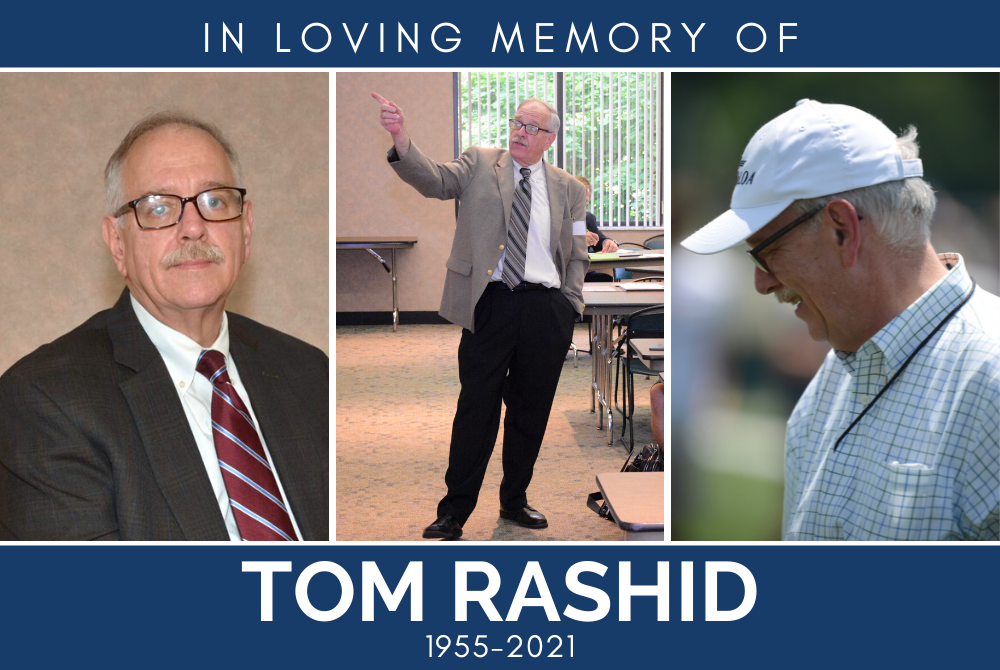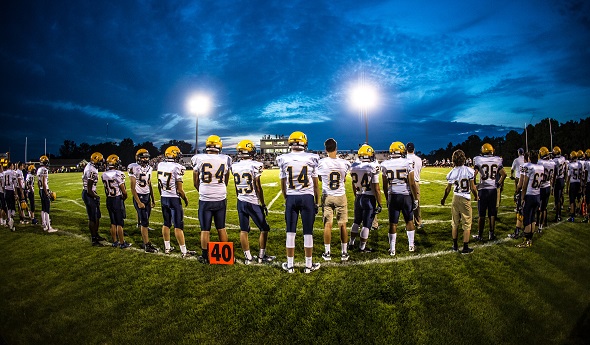
MHSAA Associate Director Rashid Dies at 66
By
Geoff Kimmerly
MHSAA.com senior editor
December 4, 2021
Thomas M. Rashid, who served as associate director for two executives during 18 years with the Michigan High School Athletic Association, died Friday, Dec. 3, after a courageous battle with cancer. He was 66.
Rashid became lead assistant to retired Executive Director John E. “Jack” Roberts in 2003, and continued serving in that position after Roberts’ retirement and the selection of Mark Uyl as the next MHSAA leader in 2018.
Rashid was best-known by the athletic directors who have served the MHSAA’s 750 high schools, as Rashid often was their first call with questions regarding the MHSAA Handbook or eligibility issues. Rashid also led the annual UPDATE meetings tour, during which he would provide training and answers on the latest rules changes at stops all over the state. He coordinated and presented orientations each fall for newly-hired athletic directors and also presented annual sessions to administrative assistants.
He served as the MHSAA’s administrator of boys lacrosse for its entirety as an MHSAA-sponsored sport, beginning in 2005, and also oversaw the MHSAA’s Charles E. Forsythe, Allen W. Bush and Vern L. Norris awards programs.
“We are heartbroken with the loss of our dear friend and colleague, Tom,” Uyl said. “He had so many incredible gifts, the greatest being his ability to talk and communicate with people even when having to share difficult or bad news. He was so good with people, and his care and concern for others is one of Tom’s greatest legacies.
“So many of us are hurting because Tom was such a special man who made impacting people and school sports in our state his life’s work and passion. His example and legacy of helping others will live on within the MHSAA community for years.”
Prior to joining the MHSAA staff, Rashid served as director of physical education and athletics for the Archdiocese of Detroit, and as Director of the Catholic High School League, for 15 years. In those positions, he coordinated athletic schedules and tournaments for the league’s 37 schools. He also served on the MHSAA’s legislative body – the Representative Council – from 1988 until his hire at the MHSAA, including as the Council’s Secretary-Treasurer.
Rashid graduated from St. Alphonsus High School in Dearborn in 1973. He obtained his bachelor’s degree in history from Eastern Michigan University, and his master’s degree in urban education from the University of Michigan-Dearborn.
He became athletic director at St. Alphonsus in 1977, serving in that position for seven years before working in the same capacity at Riverview Gabriel Richard for slightly more than three years until joining the Catholic League staff as assistant director in December 1987. He assumed the Catholic League’s top post the following August.
Rashid sat on the Board of Directors for the Michigan Interscholastic Athletic Administrators Association from 1988-2000 and served as its president in 1998.
He received national recognition in 1999 when he was presented with the National Interscholastic Athletic Administrators Association’s State Award of Merit. In 2001, Rashid was honored with the MHSAA’s Allen W. Bush Award, which recognizes noteworthy behind-the-scenes support to interscholastic athletics. In 2003, Rashid received Athletic Director of the Year awards from the MIAAA and National High School Athletic Coaches Association, and he also received an NFHS Citation that year.
He was named to the Detroit Catholic High School League Hall of Fame in 2002 and Michigan High School Lacrosse Coaches Association Hall of Fame in 2017. He also received the MIAAA's Special Recognition Award in 2017 for his continued service to the school sports community.

MHSAA Opposes Big Ten Friday Football
November 2, 2016
By Geoff Kimmerly
Second Half editor
The executive director of the Michigan High School Athletic Association said today that he is “disappointed and disheartened” by the Big Ten Conference announcement that it will play and televise football games on Friday nights beginning with the 2017 season.
Friday night football remains one of the strongest and longest-standing traditions in high school athletics, and the MHSAA has fought since the start of this century to keep Friday nights sacred against the overstepping of college football and the damage televised Big Ten games are now expected to cause to attendance and media coverage of the sport at the high school level.
MHSAA Executive Director John E. “Jack” Roberts was contacted by both Big Ten Conference commissioner Jim Delany and Michigan State University athletic director Mark Hollis before the decision was announced. Roberts said he is appreciative of Michigan State and University of Michigan’s low tolerance to be included in this venture – at most, both will host a Thursday or Friday night game during Labor Day weekend and play one Friday night away game during the remainder of a season – but remains frustrated that similar respect for high school football was not shown by the conference as a whole.
Michigan State has played Friday night games during Labor Day weekend the last six seasons, hosting five and playing at Western Michigan University in 2015. However, most Michigan high school games continue to be scheduled and played on the Thursday before Labor Day, relieving holiday travel conflicts in most communities. University of Michigan did play on the Thursday before Labor Day at University of Utah in 2015, but has not played on a Friday night of Labor Day weekend this decade. The Wolverines are one of five Big Ten schools without a Friday night game in 2017.
“We are saddened by this decision. We had hoped that the Big Ten Conference would stay above this. We think this cheapens the Big Ten brand,” Roberts said. “Fans won’t like this. Recruits won’t like this. And high school football coaches won’t like this.
“We are grateful that Michigan State University and the University of Michigan are trying to minimize the effects of this decision by the Big Ten. But overall, this is just the latest step by major college athletics in the pursuit of cash that is just crushing high school sports.”
The MHSAA has shown its opposition to the use of Friday nights for televised collegiate football games for more than 15 years, dating back to 2001 when the NCAA lifted its restrictions on Friday night telecasts, which at first led to the broadcasting of “mid-major conference” games on the same night traditionally reserved for high school athletes.
The MHSAA launched in 2001 its “Save Our Friday Nights” campaign to emphasize the role that Friday night high school athletic events play in communities and to rally MHSAA member schools to contact NCAA member school football coaches, athletic directors and conference commissioners to voice their concerns.
In addition to causing lower attendance at events going up against Big Ten football games, Roberts anticipates that Friday night college games also will leave high school football as a secondary priority in many media markets. More than 80 radio stations statewide cover high school games regularly, but many also carry Michigan State or University of Michigan football. High school football could lose significant time on local TV highlights shows and in print and online coverage as well, as resources are diverted to cover a college game – potentially quieting significantly the positive buzz that comes from the typical high school football Friday night.
“Everyone knows that football is struggling right now,” Roberts said. “It’s getting a lot of bad publicity. Participation is declining. And now this; there couldn’t be worse timing.”
PHOTO: Grand Ledge takes on Okemos under the Friday night lights this season. (Click to see more from HighSchoolSportsScene.com.)

